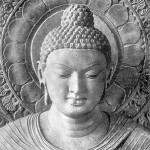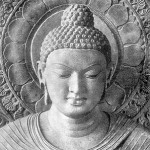by Phil Brown
 For many Mahayana Buddhists mid-January marks the celebration of New Year (although some Mahayana Buddhist such as Japanese Zen, celebrate the New Year on December 31st). In countries such a Tibet and Myanmar it is observed with diverse ceremonies (such as yak-butter sculpting in Tibet). It is seen as a time of cleansing from sins of the past year and resolving to make a fresh start.
For many Mahayana Buddhists mid-January marks the celebration of New Year (although some Mahayana Buddhist such as Japanese Zen, celebrate the New Year on December 31st). In countries such a Tibet and Myanmar it is observed with diverse ceremonies (such as yak-butter sculpting in Tibet). It is seen as a time of cleansing from sins of the past year and resolving to make a fresh start.
The New Year is a an interesting holiday for Buddhists because when you invite mindfulness into your life and endeavor to practice it consistently, every moment holds the same potential as the next, so that the passing of the calendar year might be viewed as just one more moment. Each day offers us the opportunity to connect deeply with our interdependence on each other and the world that supports our being. We can learn to be at ease in each of the instants and reduce the impact of our disappointments and troubles. This take on the New Year offers us, as one of Dr. Arnie Kozak’s students put it, the opportunity to wish ourselves and others a “Happy New Instant.”
The New Year is also inevitably a time for reflection and a review of where our lives have taken us. All our actions lead to consequences, the law of karma, and we have to live with these consequences. But we don’t have to be controlled or governed by them. In this sense the Buddhist’s view for how to treat New Year shares some of the perspective of the Jewish Yom Kippur, a time of individual atonement and renewal in the presence of community.
When we meditate we can sometimes feel the concept of time change into a seamless fabric, bringing us into a wider sense of who we are and can be. There can be great freedom in loosening our grip on time — the freedom to experience each instant as a place to rest in ease and grace.
Here is a simple ceremony that you can try as an alternative to lists of things to do in the New Year. After meditating or praying for a while on aspects of our lives, relationships with others that we don’t feel good about, or common self-criticisms, write a couple of them in summary form on a slip of paper, fold it, and wrap it with the intention of your self-honesty. Safely light a small fire ( a candle will do, but best done outside). Fold the slip of paper, light it and let it burn on a safe surface. As you do this let the paper stand as a symbol of your ability to open yourself to new possibilities, and free yourself in this moment. The fire burns the karma, and allows us to feel the beauty of our freedom to begin anew.
Happy New Instant from the Buddhist Sangha of Bucks County!




